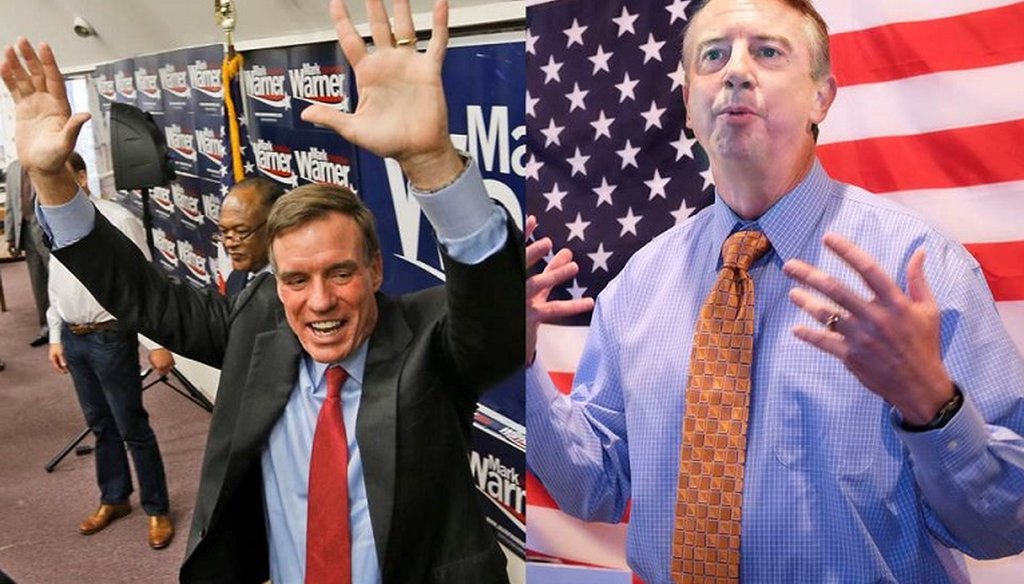Stand up for the facts!
Our only agenda is to publish the truth so you can be an informed participant in democracy.
We need your help.
I would like to contribute

U.S. Sen. Mark Warner, D-Va., left, and Republican challenger Ed Gillespie speak at rallies during the last weekend of campaigning.
It’s Election Day, so let’s recap some major claims from Virginia’s main event: the U.S. Senate race between Democratic incumbent Mark Warner and Republican Ed Gillespie.
Warner: Gillespie’s "firm even lobbied for five foreign governments, including a dictator now awaiting trial for war crimes."
Ed Gillespie’s lobbying firm, Quinn Gillespie and Associates, was hired by five governments over the period of 2003 to 2008 to help set up meetings with decision-makers in Washington and help those countries on specific issues or to improve overall goodwill. Those governments were the Ivory Coast, Pakistan, Costa Rica, Bosnian Serb Republic and Macedonia. At the time, the Ivory Coast was led by Laurent Gbagbo. After a six-month fight to maintain power in 2010-11, Gbagbo was charged and will stand trial on war crimes charges, including inciting the deaths of at least 3,000 people.
But Gillespie was on leave and working at the Republican National Committee during all but the last few months of the six-month period the work for the Ivory Coast was done. Plus, the firm’s contract with the Ivory Coast said the work would focus on assuring other nations that the Ivory Coast was moving to free and fair elections. But the firm later realized that Gbagbo would not be seeking democracy.
The firm collected about $3 million from the foreign contracts, or only about 5 percent of its overall income during that period. Democratic lobbyists made up the majority of the employees on those cases, too. We found that there was a great deal of context left out and rated the claim a Half True.
Gillespie: Mark Warner voted for "nearly $1 trillion in new taxes and $7 trillion in new debt."
Warner did vote for a Senate budget plan, written by Democrats, in March 2013. It squeaked through the Senate on a 50-49 vote but died in the House. The plan called for $975 billion in new revenues over a decade that would come from tax increases on high earners and corporations. That would be matched by an equal amount of budget cuts.
That plan also estimated that it would increase total debt from $17.1 trillion in fiscal year 2013 to $24.4 trillion in fiscal year 2023, or an increase of $7.3 trillion. We rated the claim True.
Warner: Gillespie "supports a personhood amendment."
Warner based this accusation on the Republican National Committee’s platform in 2004, when Gillespie was chairman. The platform called for a constitutional amendment specifying that legal personhood begins at conception, something Republicans have adopted at each convention since 1984.
Personhood legislation has drawn enormous debate in Virginia and around the country. Supporters say the laws provide a legal remedy if an unborn child is killed by neglect or a third party. Opponents say the measures are a ruse to challenge rights to abortion and contraceptives that could prevent a fertilized egg from implanting in a uterus.
Gillespie does not include a personhood amendment as a policy he supports on his website. The National Right to Life endorsed Gillespie, citing his work at the RNC, but the organization did not provide any information on whether he supported the personhood legislation. We could find no evidence that Gillespie supports a personhood amendment, so we rated the claim False.
Gillespie: "This administration is slashing the Navy to pay for more Obamacare."
Congress appropriated $161.4 billion for the Navy during fiscal 2013 and $149.8 billion in 2014. The decrease stems from a partisan showdown over the federal debt in 2011. In return for raising the debt limit so the nation could pay its bills, Congress and the White House agreed to a deal that triggered $1.2 trillion in automatic budget cuts over 10 years. Half the cuts will be made in domestic programs, which Democrats sought to protect, and half will come in defense spending -- including the Navy -- that Republicans wanted to shield.
The Navy falls under discretionary spending, which accounts for about 40 percent of all federal outlays. These are programs that receive annual appropriations subject to the whims of Congress and are affected by the deal. Although defense consumes about half of the discretionary budget, other areas include education, agriculture and housing.
Obamacare was set up to be self-supporting through a series of specially enacted taxes and long-term Medicare savings. It doesn’t rely on an annual appropriation. In other words, the ACA and the Navy are supported by two unconnected funding streams. We rated the claim Pants on Fire.
Warner: Position on opposing legislation that would take away existing health care plans.
Republicans, including Gillespie, have frequently accused Warner of breaking his December 2009 promise, in which he said, "Let me make clear, I’m not going to support a health care reform plan that’s going to take away health that you’ve got right now or a health care plan that you like." Warner was one of 60 senators who voted for Obamacare after that. But last fall, millions of Americans who buy their own insurance were told their plans would be canceled because they didn’t meet minimum coverage requirements in the law.
The bill, as written, required that all Americans have health insurance and that policies bought after the signing date would meet minimum coverage standards. Policies in effect before the bill signing would be exempt from that requirement, but the bill left it to the White House to write the specific regulations. The Obama administration subsequently wrote tough rules that prevented insurers from adjusting plans to market conditions or offering them to new clients -- all but ensuring insurers would pull the plug on substandard plans. As a result, several million people were notified last fall that their plans were being canceled.
Warner says he was blindsided by the president’s regulations. But after it became clear that many insurance plans would be canceled, Warner still voted with other Democrats against a proposal to cancel the minimum coverage requirements. For his role, we gave Warner a Half Flip.
Gillespie: Position on immigration reform
In a CNBC interview last year, Gillespie was keen on the so-called "Gang of Eight" bill that would bolster border security and provide a pathway to citizenship for 12 million people who entered the country illegally. He described the legislation as "good policy" that "can be perfected." But this year, Gillespie’s says he would have voted against the measure.
Gillespie, since at least 2006, has had a three-pronged approach to comprehensive immigration reform. He supports beefed up border security and a pathway to legal residency in the U.S.; he opposes citizenship for those who entered the country illegally.
The bill, as it passed the Senate last year, would create a lengthy route to citizenship -- an action Gillespie opposes. Although his rhetoric has shifted, Gillespie has not changed his conditions for supporting comprehensive reform and we’ve concluded there’s been "No Flip" in his overall immigration stand.
Democratic Party of Virginia: Ed Gillespie’s 2006 book "promoted an individual health-care mandate, and recommends that it be enforced by the IRS through the income tax code."
Under the Affordable Care Act, also known as Obamacare, Americans without health coverage start paying a penalty this year. By 2016, the levy grows to $2,085 per family or 2.5 percent of household income -- whichever is greater. Certain tax filers facing financial hardship and other situations are exempt. In Gillespie’s 2006 book, "Winning Right: Campaign politics and conservative policies," he wrote that health care reforms should ensure that uncovered adults gain health care insurance so they won’t remain "free riders" who get care at others’ expense.
A conservative columnist told us that he thinks Gillespie was endorsing an unsuccessful proposal President George W. Bush made one year later offering tax breaks to insured households. That "carrot" approach sought voluntary compliance and is different from Obama’s "stick" approach of insisting people obtain coverage or face tax penalties. In ensuing years, Gillespie emerged as a steadfast opponent to the individual mandate in Obamacare.
It should be noted that Gillespie offered tax consequences – a halving of standard deduction for the uninsured -- as one possibility for reforming health care. His book suggested Health Savings Accounts as another way to ensure adults get coverage. Despite his campaign’s denials, the tax penalty fits the definition of an individual mandate.
Although it may not have been Gillespie’s intention, his unclear book passage can be easily interpreted as advancing the idea of individual mandates during a formative time for health policy. We rated the claim a Mostly True.
Republican Party of Virginia: "Ninety-seven percent of the time. That’s how often Mark Warner votes with President Obama."
According to statistics kept by CQ Weekly, a nonpartisan Washington news service, Warner has voted in accord with the president on 97 percent of the bills in which Obama has staked out a clear position. This dates to 2009, when both Warner and Obama took office.
There are a few things to keep in mind. First, Obama has taken a position on only 28 percent of the bills Warner has voted on, and more than half of those were for confirmation of presidential appointees. Also, Senate Democrats on the whole have backed the president 95.4 percent of the time during Warner’s term.
Warner most notably backed the president when he voted for Obamacare in 2010. He’s bucked the president by voting against regulating assault weapons and against delaying the start of automatic budget cuts in 2013.
Warner says the presidential support rating ignores his efforts to work across the aisle with Republicans, particularly trying to fashion a bipartisan plan to reduce debt. He correctly notes that several congressional watchdogs have rated him among the most conservative Senate Democrats. But his presidential support is what it is -- 97 percent -- and we rated this claim True.
Our Sources
PolitiFact Virginia, "Warner says Gillespie’s firm lobbied for brutal dictator," Oct. 24, 2014.
PolitiFact Virginia, "Warner says Gillespie supports a personhood amendment," Aug. 4, 2014.
PolitiFact Virginia, "Democrats say Ed Gillespie’s book promoted individual mandates," April 27, 2014.
PolitiFact Virginia, "Warner has mixed record on protecting pre-Obamacare insurance plans," Sept. 29, 2014.
PolitiFact Virginia, "Ed Gillespie says White House is cutting Navy to pay for Obamacare," Aug. 3, 2014.
PolitiFact Virginia, "Ed Gillespie’s immigration reform position remains steady," July 21, 2014.
PolitiFact Virginia, "Gillespie says Warner voted for new taxes and more debt," Feb. 10, 2014.
PolitiFact Virginia, "Virginia GOP says Warner voted with Obama 97 percent of the time," May
15, 2014.












































